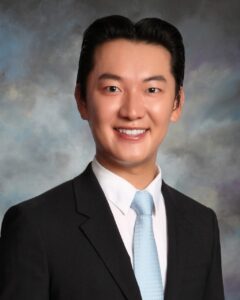By Harvard Law School Student Alex Zhang ‘24
The last time I said goodbye to Ted*, he was upright in his hospital bed, swaddled in his blue hospital gown with a wide smile. As I looked back at him, I wanted to feel happy. I had successfully executed my first full estate plan for this man that had been a stranger only months before. But all I could feel was a sense of sadness that my time with him had come to an end.

I came to law school with the niche goal of working in estate planning. In fact, one of the primary factors that attracted me to Harvard was the Estate Planning Project within the Veterans Law & Disability Benefits Clinic. As soon as I started my second year in law school, I registered for the clinic. As expected, I learned a lot about estate planning. I singlehandedly drafted documents for all my cases, only receiving support as needed from my clinical instructor. Although jarring at first, it was ultimately extremely rewarding to have so much responsibility. From drafting wills to executing health proxy forms, I developed a full range of professional skills.
But what surprised me is that I learned so much more beyond estate planning from interacting with my clients. It is for this reason that the Veterans Law & Disability Benefits Clinic is the most rewarding experience I have had in law school.
Ted was my first client in the clinic. He was a retired veteran in hospice care in need of a full estate plan. When I walked into the room my first day, he took a long look at me and said, “You’ve got good style. I like that.” From that moment on, I knew we would be friends. Through my conversations with Ted, I learned that one of his adult children had been causing trouble in the family by attempting to leave the entire estate to himself. But Ted wanted to dispose of everything to his grandchildren. I also learned that Ted had a family from a previous relationship that none of his children seemed to know about. In fact, he even had a granddaughter he had lost contact with. These were all factors that I had to account for when drafting an efficient estate plan.
For several months, Ted and I would meet to talk and revise his estate planning documents. In that time, Ted taught me a lot about life. Sure, I taught him a lot about estate planning, but I learned so much more from him. I learned about his work as a carpet installer. I learned about his time in the army and the friends he had made and lost. I learned that his favorite foods were hamburgers and apple pies from McDonalds. I learned about mistakes he had made in life and regrets he had.
By the time my last day with Ted came, it felt surreal to say goodbye. I realized as he signed and executed his will that my work was over—I had fulfilled the job I came to do. Ted finally had an estate plan that left his legacy the way he wanted it. We chatted for a little longer after the will was finished, delaying the inevitable. I asked if he needed anything else. Ted smiled at me. “It’s time,” he said. And we both knew. He shook my hand and thanked me. I thanked him back. And that was the last time we saw each other.
In law school, it is easy to get trapped focusing on the big picture. What firm do I want to work at after graduation? Corporate law or litigation or maybe clerkship? What will be my career path? But working with Ted, I remembered that there are so many things much more important to me. Ted taught me to appreciate the minutiae: the small conversations and laughs and stories he told me as I sat beside his hospital bed. At the end of my life, I think what will be meaningful to me is the connections I have made—the people I have impacted and who have impacted me in return. My time with Ted was limited, only a few months. But in those months, we were two very different people from different backgrounds who connected. And that was enough.
*Client’s name has been changed for confidentiality.
